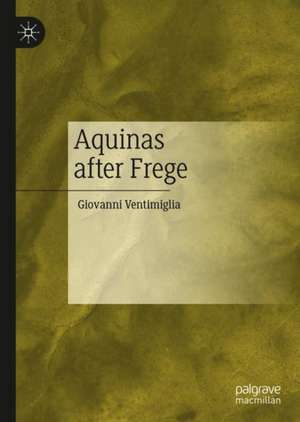Aquinas after Frege
Autor Giovanni Ventimigliaen Limba Engleză Hardback – 22 sep 2020
This book provides a fresh reading of Aquinas’ metaphysics in the light of insights from the works of Frege. In particular, Ventimiglia argues that Aquinas’ doctrine of being can be better understood through Frege’s distinction between the ‘there is’ sense and the ‘present actuality’ sense of being, as interpreted by Peter Geach and Anthony Kenny. Aquinas’ notion of essence becomes clearer in the light of Frege’s distinction between objects and concepts and his account of concepts as functions. Aquinas’ doctrine of trancendentals is clarified with the help of Frege’s accounts of assertion and negation.
Aquinas after Frege provides us with a new Aquinas, which pays attention to his texts and their historical context. Ventimiglia’s development of ‘British Thomism’ furnishes us with a lucid and exciting re-reading of Aquinas’ metaphysics.
Aquinas after Frege provides us with a new Aquinas, which pays attention to his texts and their historical context. Ventimiglia’s development of ‘British Thomism’ furnishes us with a lucid and exciting re-reading of Aquinas’ metaphysics.
| Toate formatele și edițiile | Preț | Express |
|---|---|---|
| Paperback (1) | 582.92 lei 6-8 săpt. | |
| Springer International Publishing – 23 sep 2021 | 582.92 lei 6-8 săpt. | |
| Hardback (1) | 587.20 lei 6-8 săpt. | |
| Springer International Publishing – 22 sep 2020 | 587.20 lei 6-8 săpt. |
Preț: 587.20 lei
Preț vechi: 690.83 lei
-15% Nou
Puncte Express: 881
Preț estimativ în valută:
112.36€ • 117.31$ • 92.99£
112.36€ • 117.31$ • 92.99£
Carte tipărită la comandă
Livrare economică 04-18 aprilie
Preluare comenzi: 021 569.72.76
Specificații
ISBN-13: 9783030483272
ISBN-10: 3030483274
Pagini: 259
Ilustrații: XVII, 274 p.
Dimensiuni: 148 x 210 x 23 mm
Greutate: 0.51 kg
Ediția:1st ed. 2020
Editura: Springer International Publishing
Colecția Palgrave Macmillan
Locul publicării:Cham, Switzerland
ISBN-10: 3030483274
Pagini: 259
Ilustrații: XVII, 274 p.
Dimensiuni: 148 x 210 x 23 mm
Greutate: 0.51 kg
Ediția:1st ed. 2020
Editura: Springer International Publishing
Colecția Palgrave Macmillan
Locul publicării:Cham, Switzerland
Cuprins
1. State of the Art.- 2.Being.- 3. Essence.- 4. Transcendentals.- 5. The Sense of Being in Context.- 6. Conclusions.
Notă biografică
Giovanni Ventimiglia is Full Professor of Philosophy and Vice Dean of the Faculty of Theology at the University of Lucerne, Switzerland. Founder of the Lugano Institute for Philosophical Studies in 2003, he teaches medieval philosophy and ontology, and has published widely in these fields, including: Is the Thomistic Doctrine of God as "Ipsum Esse Subsistens" Consistent? (2018), Tommaso d’Aquino (2014), To be o esse? (2012) and Differenza e contraddizione(1997).
Textul de pe ultima copertă
This book provides a fresh reading of Aquinas’ metaphysics in the light of insights from the works of Frege. In particular, Ventimiglia argues that Aquinas’ doctrine of being can be better understood through Frege’s distinction between the ‘there is’ sense and the ‘present actuality’ sense of being, as interpreted by Peter Geach and Anthony Kenny. Aquinas’ notion of essence becomes clearer in the light of Frege’s distinction between objects and concepts and his account of concepts as functions. Aquinas’ doctrine of trancendentals is clarified with the help of Frege’s accounts of assertion and negation.
Aquinas after Frege provides us with a new Aquinas, which pays attention to his texts and their historical context. Ventimiglia’s development of ‘British Thomism’ furnishes us with a lucid and exciting re-reading of Aquinas’ metaphysics.
Aquinas after Frege provides us with a new Aquinas, which pays attention to his texts and their historical context. Ventimiglia’s development of ‘British Thomism’ furnishes us with a lucid and exciting re-reading of Aquinas’ metaphysics.
Caracteristici
Provides a fresh reading of Aquinas’ metaphysics in light of certain insights from the works of Frege Argues that Aquinas’ doctrine of being can be better understood though Frege’s distinction between the ‘there is’ and the ‘present actuality’ sense of being Re-interprets Aquinas from a genuine historical perspective
